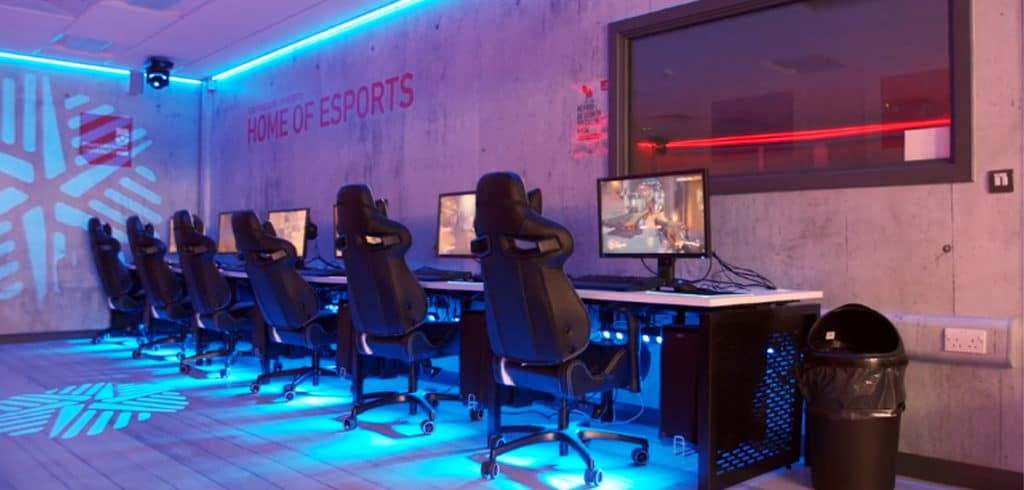Ad
In this special series of in-depth articles, Esports News UK, in collaboration with the betting partner GGBET UK, delves into the stories, moments, and personalities that have left a lasting impression on the past, present, and future of the UK esports scene.
In this article, Reece Barrett runs through the current state of higher esports education in the UK.
A brief history of UK esports courses
The idea of bespoke UK esports courses in universities has been a hotly debated topic since they were first announced, and the community has argued if they are worth it ever since.
In 2017, Staffordshire University shared a press release with the rest of the class that caught the eyes of the BBC and national media: Staffordshire was to become the first UK university to offer a degree in esports.

The uni – which already had a strong reputation in games design degrees – saw a rise in esports academia in the US, and tried to recreate Stateside success with a three-year esports degree that began in 2018.
Others soon followed suit. The University of Roehampton launched an esports scholarship in 2018, while the University of Chichester launched its esports degree in 2019, bringing on board experts in the space like early UK pro gamer Rams ‘R2K’ Singh and FIFA/FC caster Brandon Smith, mixing them with sports media veteran Ian Worden and others to make a successful combo. They have annual broadcast days, where the students essentially plan and deliver an entire broadcast, from securing sponsors to arranging the layout of the stage, sorting music, lighting, guests and more.
The Confetti Institute of Creative Technologies, part of Nottingham Trent University, launched a BSc (Hons) degree in esports production in 2020. Unis including York, Teesside, Birmingham City, Sheffield Hallam, Sunderland, Salford, Northampton and more started to run offerings too, with colleges like Gower College Swansea also offering degrees.
While academia trickled down the age groups, with courses also available to people younger than 18, this article is solely focused on the university level.
Prior to all this activity, national body NUEL (now University Esports) paved the way with national tournaments for uni students, as did NSE (National Student Esports). NUEL formed in 2010 and NSE in 2017.
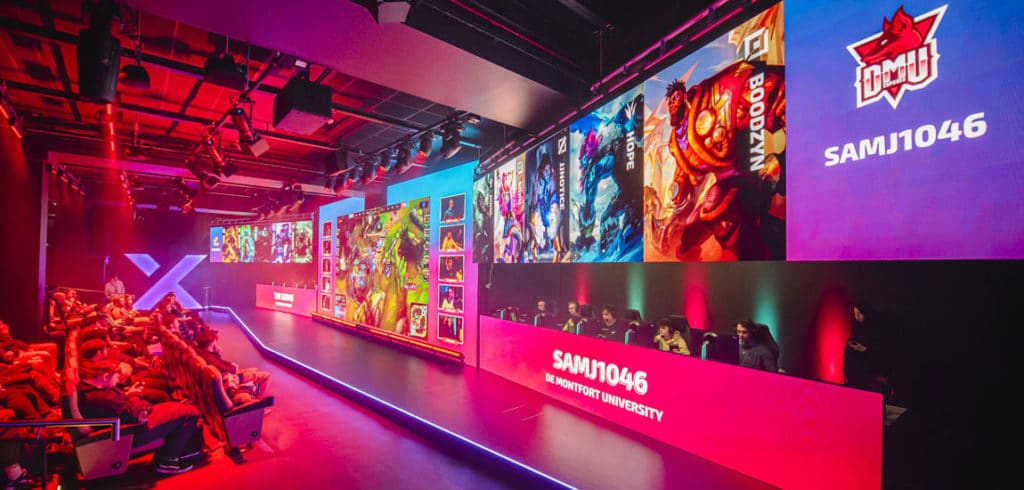
Unfortunately, things haven’t been perfect. By the time the first cohort of Staffs Uni students were due to graduate in 2021, complaints started to arise on social media about some of the course content and the way it was being taught. Esports News UK conducted an investigation into Staffordshire University’s esports degree here.
The University of Portsmouth was also due to offer an Esports Coaching & Performance degree, which ended up being axed before it got underway. Some other course providers have come and gone in the UK.
But despite this, many providers have pushed on, and things have no doubt improved in recent years.
The current state of UK esports courses, further education and those who are championing it

Esports courses come at a time where pro gamer and streamer topped a UK children’s career poll recently. Young people are looking at career options in the industry, and while courses can’t make you a great player or streamer, they do offer students a pathway into the wider industry and other roles.
Many universities have opened excellent esports facilities, tStaffs Uni now has new multi-million pound esports facilities. The course content and lecturers have all improved.
The likes of Scan Computers and Yoyotech are helping institutions outfit their esports facilities.
There’s now also the College of Esports degrees at the Velodrome in East London, with students getting involved with pro broadcasts like the Rocket League London Major and going on trips to South Korea to visit Gen.G and more. Despite the name, it’s not really a college, but runs degree courses instead.
So there has been a boom of esports education in the UK which continues to grow, with the University of Suffolk being one of the latest to launch a course, which will take on students in 2025.
The University of Nottingham hosted the inaugural International Federation of Esports Coaches’ Esports Coaching and Performance Summit at their Waterside campus in 2023.
While the UK-based federation of esports coaches has now collapsed as another casualty of the esports winter, the summit gave students and other professionals the chance to hear seminars from industry experts, such as Team Falcons’ Director of Performance Lars Robl, who has won four Counter-Strike majors as a sports psychologist.
The University of Warwick hosted the first ESI Next Gen conference in 2023, which brought together leaders from educational institutions in the UK beyond and professionals from the esports industries to discuss the skills and employment the industry can offer new students.
Warwick is also one of several universities to take esports more seriously in recent years, having made investments in its esports offerings. Warwick has also some of the best student players in esports, having won NSE’s Esports University of the Year for an impressive six years in a row.
The University of Sunderland also spent up to £1m to transform parts of the Sir Tom Cowie campus into bespoke esports areas when it launched its Esports Event Management degree.
Staffs is set to host the Esports Research Network in 2024 – a conference to share ideas about the challenges that the industry is facing – and cut the ribbon at their facilities with a three-day tournament called Campus Clash.
Gone are the days of some esports students knowing more than the lecturers, as at several institutions, those with experience in esports have been appointed to teach.
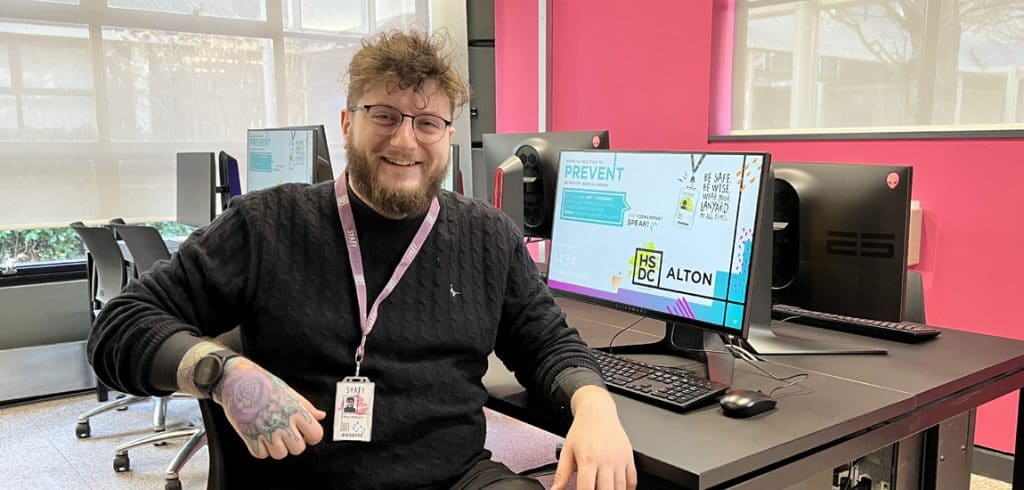
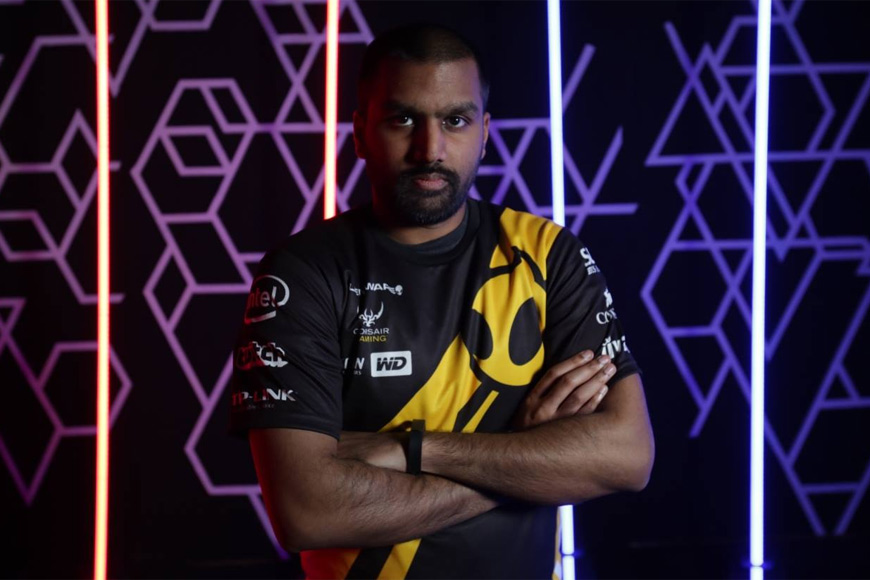
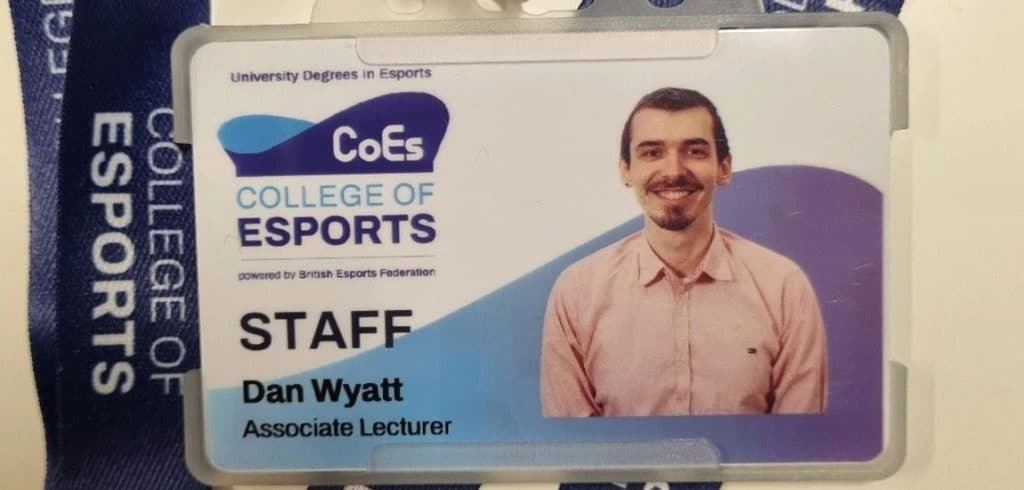
Rhys ‘Kybet’ Williams of League of Legends coaching (pictured above) is now at Staffs Uni.
One of the UK’s first professional gamers, Rams ‘R2K’ Singh, lectures at the University of Chichester.
And the aforementioned College of Esports has UK League of Legends personality Dan ‘Foxdrop’ Wyatt on board – another recognisable name on the lecturer sheet.
College of Esports also has an exclusive degree-level partnership with British Esports for the 2022/23 academic year and onwards. It offers eight three-year full time courses, the majority of which are built around a base ‘International Esports Business’ curriculum which then incorporates other elements such as digital marketing or events management.
Professor Philip Wilson and David Thomson launched College of Esports, and encourage their students to get out and secure work experience at esports events.
UK university esports tournaments
University Esports is one of the premier tournament providers in the UK, hosted by NUEL (formerly known as the National University Esports League).
NUEL was founded in 2010 by Josh Williams and now offers more than £16,000 in tournament prizing, plus the opportunity to play live on stage at Confetti X in Nottingham.
Over 15,000 students are playing some form of these tournaments each year. And the best of the best can qualify for the Europe-wide University Esports Masters.
Today NUEL is owned by GGTech and also works beyond the university space to work on different esports broadcasts.
Another university esports body in the UK is National Student Eports (NSE). Its flagship competition is the British University Esports Championship (BUEC).
Tournaments run in the Winter and Spring allow institutions to gain points in each game they compete in, with the university with the most points at the end of the year being named the Esports University of the Year (the aforementioned Uni of Warwick being six-time winners).
The NSE, like University Esports, also encourages students to connect with industry via a ‘Careers Boost’ programme, plus it has an Intel FutureGen cohort of rising star students each year, pairing them up with industry mentors.
Looking to Ireland, and there’s the Ireland Esports Collegiate Series, which serves 16 universities (and colleges), and is owned by Irish esports organisation Nativz Gaming.
The series returned to Dogpatch Labs in Dublin for its 2024 Spring Finals Weekend earlier this year, and Nativz recently announced a path to pro for players taking part in the series, via its new esports talent academy in Ireland.
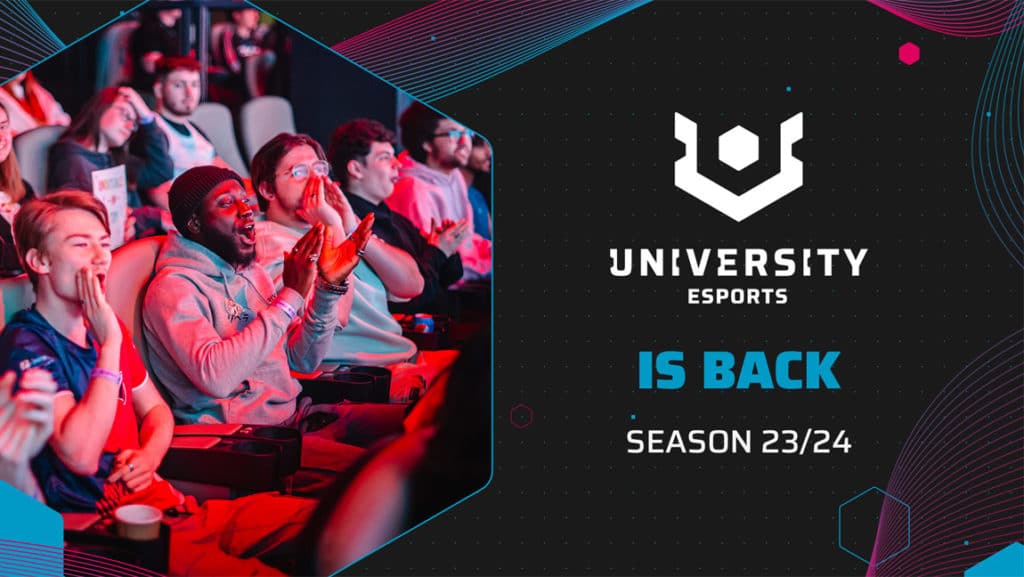
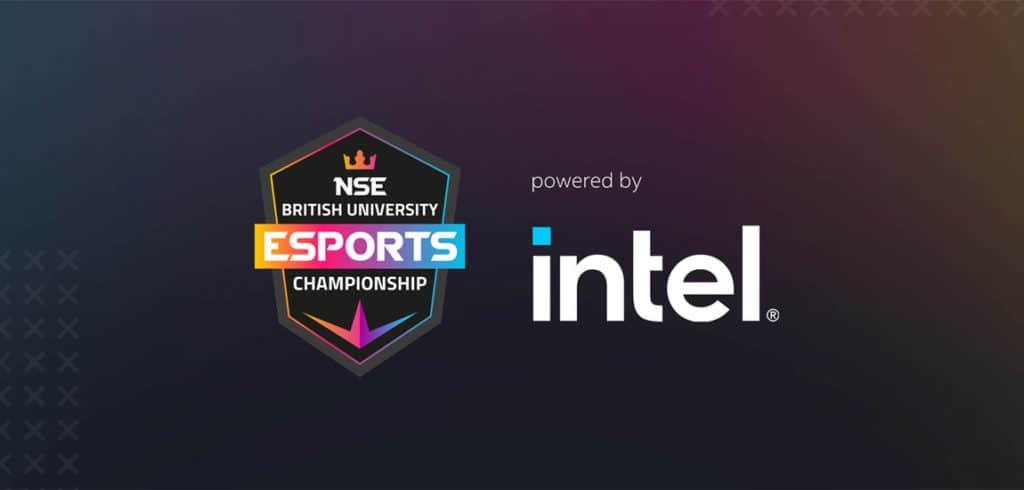
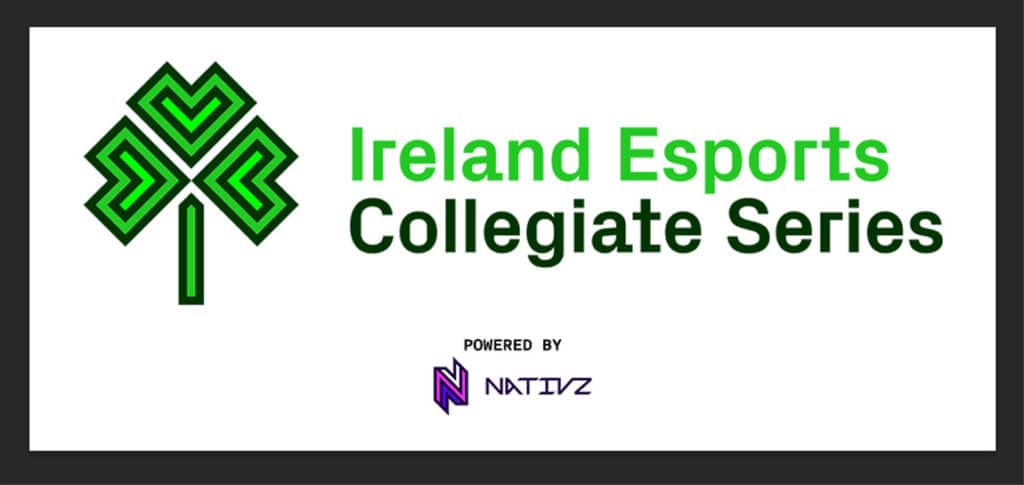
Outside of these three organisations, there is a rich competition infrastructure open to students and alumni alike.
The University Halo League (UHL) held their first LAN this year at the College of Esports (pictured, top of this section).
In June, College of Esports and Royal Holloway University teamed up for their first collaborative event, the London Lock In.
The University of Southampton has also run its SouthLANder event, which hosts institutions in offline competition with finals played out on stage.
There are too many tournaments at this level to name, but another competition to keep an eye on is the UK and Ireland Circuit (UKIC)’s Counter-Strike tournaments for universities.
And there are plenty of university student-run offerings too. Grassroots esports group and student-led collective Cosy Coop recently ran an Overwatch LAN event that raised £1,000+ for Gamers Beat Cancer.
UK university esports courses – are they worth it?
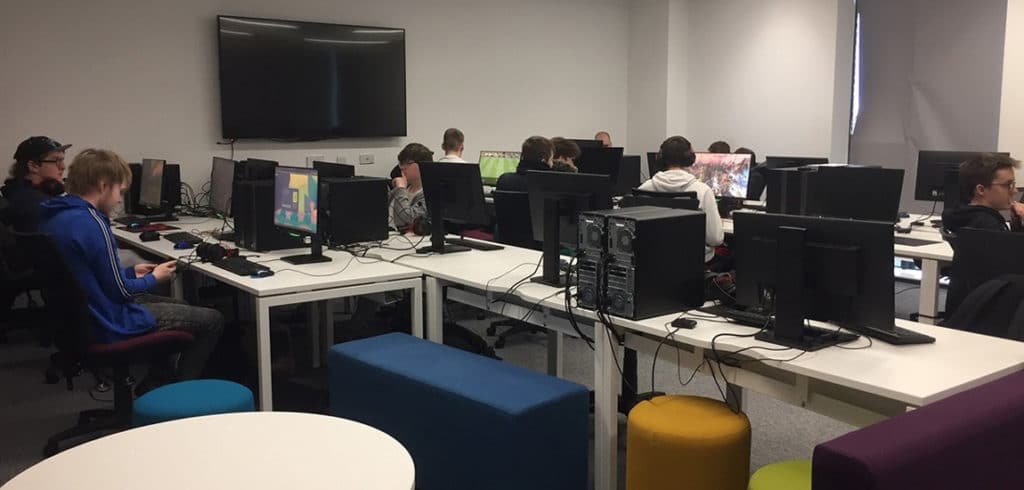
While courses continue to improve, the esports community is still unsure about the value of esports degrees, especially given the expense of tuition fees and student loans.
A report published in April 2024 noted that 55% of students interviewed in the UK, US, France, Germany and Brazil thought that a degree in an esports-related field would enhance their chances of employment in the industry.
69% also said that they believed that having an esports-related degree would be valuable to employers in the future.
The debate is often divisive on social media, and the countless opinions are too much to document here, but the discussion does seem to have mellowed over the past year or two as esports courses have been gradually accepted.
If you’re a student unsure of whether to take a course, do your research, ask friends and family for their opinions, and why not reach out to people in the industry direct? They are often happy to share advice.
Want to work in esports but not do a degree in it? Then that’s perfectly doable too!
— Frankie Ward (@FrankieWard) February 9, 2024
– Go to a university with an esports society and get involved
– Look at joining a student body like NUEL or NSE
– Volunteer at EpicLAN and Insomnia
Either choice is viable and doable
Some have also argued that esports is simply too big of a topic to cover.
Lizzie Squires from HSDC’s Alton College also co-owns Vulpine Esports, and when asked what she looks for in a potential hire, she confirmed that there is much, much more to it than just having a degree.
Lizzie said: “I think it’s very subjective to the person who is applying. In general, if somebody comes to me with a qualification in something specific, like social media, and had a passion for esports throughout their university career, or if someone comes to me with a generic esports qualification, at the moment you’re more likely to take the person with the [specific] degree and passion.
“If somebody comes to me with an esports degree who has done loads of extra experience and got loads of contacts in the industry already, then I’m more likely to take them on than someone who has done an esports degree and nothing else.”
Lizzie Squires, Alton College
“I think that might change as esports degrees become more tailored and refined and what we are looking for is an understanding of the industry.”
While the quality of esports degrees are improving, with the academia now boasting state of the art facilities and lecturers who have worked the industry, their long-term value is still unproven. The fact that many games companies have downsized over the past year also paints a difficult picture in terms of the number of jobs available for graduates and others to secure, too. Add to the circa £9,250 a year in fees and choosing to study an esports degree is a tough decision to make.
Like any university degree, it is not enough just to get the qualification. Work experience is essential too, and you can get back what you put in.
UK esports courses can help, but they are by no means essential to break through and make a name for yourself.
The facilities are there, so are the work experience opportunities available without putting yourself through a course – the choice to do what’s best for you is entirely up to you.
Stay tuned for more articles powered by GGBET UK, and see even more UK esports history content here:
Top Gambling & Casino Guides
Explore some of our most popular casino, betting, and gaming guides, trusted by UK players this year.
- Top Online Casinos UK 2025
- Best Bitcoin Casinos in 2025
- Best Betting Sites UK for 2025
- No Verification Casino Sites in the UK
- Non Gamstop Casino Sites
Reece is a sports journalist who has previously worked with the likes of BBC Radio Solent, Southern Daily Echo, Salisbury Radio, VAVEL and many more. He is currently studying a degree in Sports Journalism at Solent University.

